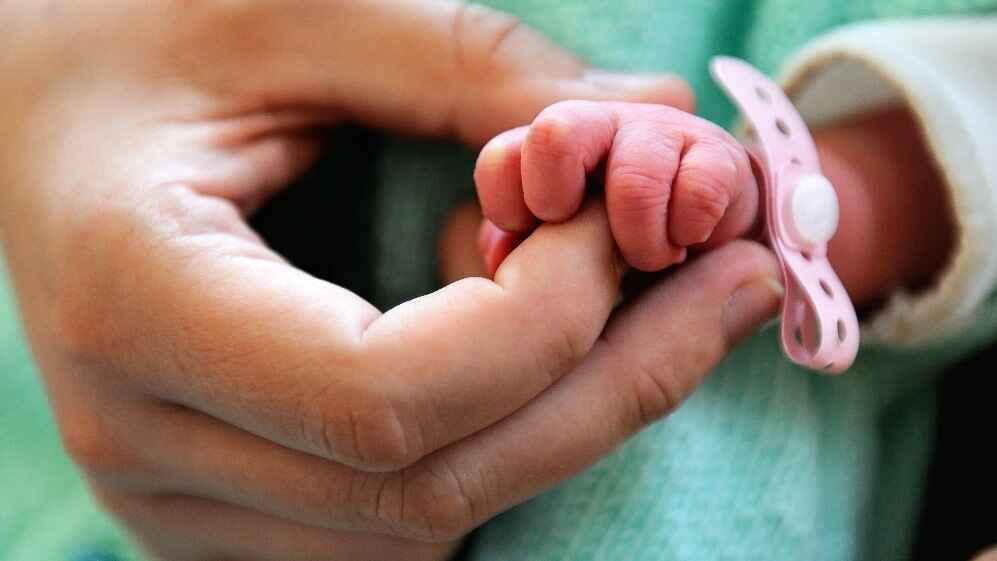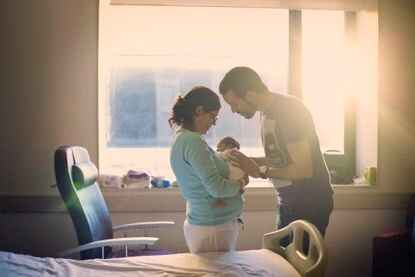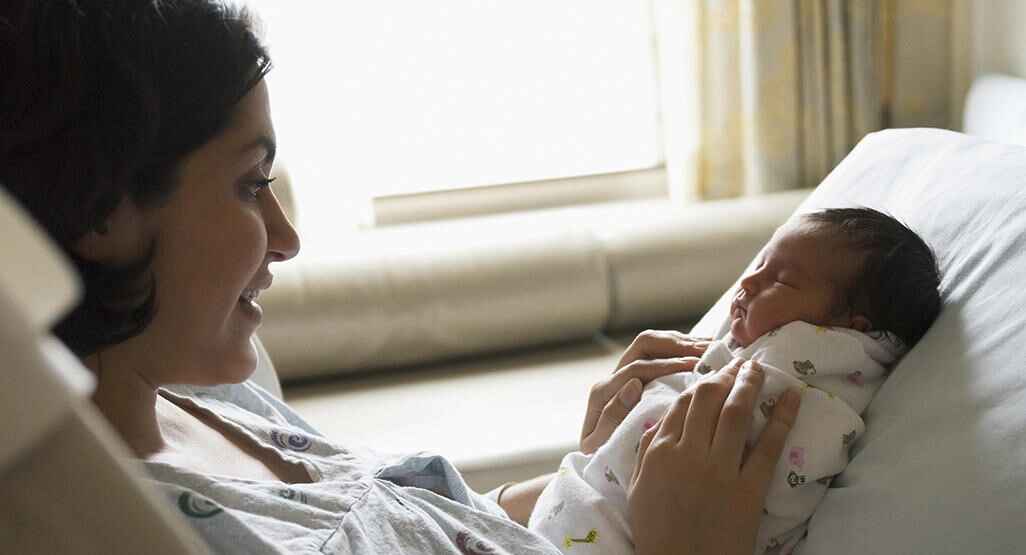Introduction to Postpartum Care: Nurturing the Journey of Motherhood
As we celebrate the miracle of new life, we recognize the paramount significance of postpartum care – a vital phase that deserves attention, understanding, and compassionate support.

Definition of Postpartum Care
Postpartum care, or the postnatal period, refers to the period following childbirth. It encompasses the care and attention provided to both the mother and her newborn as they navigate the physical, emotional, and social changes associated with the newest family member's arrival.
During this crucial time, healthcare professionals and support networks collaborate to ensure the well-being of the mother, addressing physical recovery, emotional health, and the unique needs of the newborn. Postpartum care is designed to guide mothers through the challenges and joys of the early weeks and months following delivery. Contact Sri Lakshmi Mother and Children Hospital, for the best postpartum care in KR Puram Bangalore
Importance of Postpartum Care
The importance of postpartum care cannot be overstated. This period is a time of adjustment, healing, and bonding for both the mother and the baby. Several key aspects underscore the significance of dedicated postpartum care:
- Physical Recovery: The body undergoes significant changes during pregnancy and childbirth. Postpartum care is essential for monitoring and supporting the physical healing process, including recovery from any procedures such as cesarean sections or episiotomies.
- Emotional Well-being: The postpartum period often brings a range of emotions, from joy and fulfillment to challenges and stress. Adequate postpartum care addresses the emotional needs of mothers, providing support for mental health and helping them navigate the transition to motherhood.
- Breastfeeding Support: For mothers choosing to breastfeed, postpartum care offers guidance and assistance in establishing a successful breastfeeding relationship. This includes addressing common challenges and providing resources for lactation support.
- Complication Management: Postpartum care is instrumental in identifying and managing any complications that may arise, such as infections or postpartum bleeding, ensuring the health and safety of both the mother and the baby.
- Family Dynamics: The postpartum period is a time of adjustment for the entire family. Comprehensive postpartum care acknowledges the broader context, supporting families in their transition and promoting a nurturing environment for the newborn.
At Sri Lakshmi Mother and Children Hospital, we recognize the unique and profound nature of the postpartum journey. Our mission is to provide informative and supportive content to empower mothers, their families, and caregivers with the knowledge and resources to navigate this transformative period with confidence and grace.
Stay tuned as we delve deeper into the various aspects of postpartum care, offering insights, tips, and resources to guide you on this incredible journey of motherhood. Your well-being matters, Contact Sri Lakshmi Mother and Children Hospital, for the best postpartum care in KR Puram Bangalore support you every step of the way.
Physical Recovery: Nurturing the Body After Birth

The postpartum period brings about significant physical changes as the body recovers from the miraculous journey of childbirth. At [Your Website Name], we understand the importance of providing comprehensive information and support for mothers during this phase of recovery.
Monitoring and Managing Postpartum Pain
Postpartum pain is a natural part of the recovery process, varying in intensity among mothers. Monitoring and effectively managing postpartum pain are essential components of quality care. Here's what you need to know:
- Monitoring Pain Levels: Healthcare providers will assess and monitor your pain levels to ensure they are within a manageable range. Open communication about your pain experience helps in tailoring pain management strategies to your needs.
- Pain Management Options: Various pain management options are available, ranging from over-the-counter pain relievers to prescription medications. Non-pharmacological methods such as ice packs, heat therapy, and relaxation techniques are also valuable in alleviating discomfort.
- Understanding Pain Duration: It's common to experience pain for some time after childbirth. Understanding the expected duration of postpartum pain and having realistic expectations can contribute to a more positive recovery experience.
Healing of Incisions (Cesarean Section, Episiotomy)
For mothers who undergo cesarean sections or episiotomies, specific attention is given to the healing of incisions. Proper care promotes optimal healing and minimizes complications:
- Cesarean Section Incisions:
- Keeping the incision clean and dry.
- Following healthcare provider guidelines for dressing changes.
- Avoiding strenuous activities that could strain the incision site.
- Episiotomy Care:
- Practicing good hygiene to prevent infection.
- Sitz baths to promote healing and alleviate discomfort.
- Using prescribed medications or topical treatments as advised.
- Monitoring for Signs of Complications:
- Regular monitoring for signs of infection, excessive swelling, or unusual discharge.
- Prompt reporting of any concerns to healthcare providers.
Addressing Complications

Complications during the postpartum period require prompt attention to ensure the health and safety of both the mother and the baby. Key considerations include:
- Infections: Recognizing signs of infection, such as increased redness, swelling, or discharge at incision sites. Seeking medical attention promptly is crucial.
- Postpartum Bleeding: Monitoring postpartum bleeding (lochia) for any abnormalities. Heavy bleeding, persistent clots, or foul-smelling discharge should be reported to healthcare providers.
- Pain Beyond Normal Levels: Persistent or severe pain beyond the expected duration may indicate complications and should be discussed with healthcare providers.
- Emotional Support: Acknowledging the emotional toll that complications can take and seeking emotional support from healthcare professionals, family, and friends.
At Sri Lakshmi Mother and Children Hospital, we strive to provide valuable insights and guidance to support mothers in their physical recovery journey. Stay tuned for more information on postpartum care, addressing both the physical and emotional aspects of this transformative period. Remember, your well-being is our priority.
Emotional well-being during and after pregnancy is crucial for both the mother and the baby. Postpartum mood disorders are common, affecting many women after childbirth. These disorders include postpartum depression, anxiety, and even more severe conditions like postpartum psychosis. It's essential to be aware of these issues and to seek support when needed. Here are some strategies for emotional support and coping with the challenges of motherhood:
Postpartum Mood Disorders:
- Recognize the Symptoms:
Be aware of the signs of postpartum depression and anxiety, such as persistent sadness, loss of interest, excessive worry, changes in sleep patterns, and irritability.
- Seek Professional Help:
If you or someone you know is experiencing symptoms of postpartum mood disorders, it's crucial to seek help from Sri Lakshmi Mother and Children Hospital.
Therapy, counseling, or medication may be recommended.
- Build a Support System:
Surround yourself with a supportive network of friends and family who can provide emotional support. Share your feelings and experiences, and don't hesitate to ask for help when needed.
- Connect with Other Mothers:
Joining support groups or connecting with other mothers who have experienced similar challenges can be reassuring. Sharing experiences and tips can help reduce feelings of isolation.
Emotional Support Strategies:

- Prioritize Self-Care:
Make time for self-care activities that promote relaxation and well-being. This could include taking short breaks, practicing mindfulness, or engaging in activities you enjoy.
- Open Communication:
Communicate openly with your partner about your emotions and needs. Establishing clear lines of communication can help both partners understand and support each other.
- Delegate Tasks:
Don't hesitate to delegate tasks or ask for help with household chores and childcare. Sharing responsibilities can alleviate stress and allow for more time for self-care.
- Set Realistic Expectations:
Understand that perfection is not attainable, and it's okay to ask for help. Set realistic expectations for yourself and your baby, and don't be too hard on yourself.
Coping with the Challenges of Motherhood:
- Educate Yourself:
Learn about the challenges of motherhood, both physical and emotional. Knowing what to expect can help you prepare and cope more effectively.
- Take Breaks:
It's important to take breaks when needed. If possible, arrange for short breaks where you can rest, relax, or engage in activities that bring you joy.
- Healthy Lifestyle:
Prioritize a healthy lifestyle with proper nutrition, regular exercise, and sufficient sleep. A healthy body contributes to better emotional well-being.
- Celebrate Achievements:
Celebrate small victories and achievements, no matter how minor. Recognize your efforts and progress in adjusting to motherhood.
Remember that each individual's experience is unique, and it's okay to seek professional help if you are struggling. Taking care of your emotional well-being is crucial for both you and your baby's health and happiness.
Breastfeeding Support
Importance of Breastfeeding
- Nutritional Benefits:
Breast milk provides essential nutrients and antibodies that support the baby's immune system and overall development.
- Bonding:
Breastfeeding fosters a strong emotional bond between the mother and the baby, promoting a sense of security and comfort.
- Health Benefits for Mother:
Breastfeeding helps the mother recover from childbirth more quickly and reduces the risk of certain health issues such as breast and ovarian cancer.
- Convenience and Cost-Effective:
Breast milk is readily available, requires no preparation, and is cost-effective compared to formula feeding.
Common Breastfeeding Challenges:
- Latch Issues:
Difficulty achieving a proper latch can lead to discomfort for the mother and inadequate milk transfer for the baby.
- Engorgement:
Swelling and discomfort caused by overfilled breasts can make latching difficult and lead to sore nipples.
- Low Milk Supply:
Some mothers may face challenges with low milk production, leading to concerns about the baby's nutrition.
- Painful Nipples:
Sore or cracked nipples can be a common issue, often due to incorrect latch or inadequate positioning.
- Breast Infections:
Mastitis, an inflammation of the breast tissue, can occur, causing pain, redness, and sometimes fever.
Seeking Professional Help at Sri Lakshmi Mother and Children Hospital:
- Consultation with Lactation Specialists:
Sri Lakshmi Mother and Children Hospital likely have lactation specialists who can provide personalized guidance on breastfeeding techniques, address latch issues, and ensure the baby is feeding effectively.
- Counselling program:
Hospitals often offer educational programs for expectant and new mothers, providing information on the importance of breastfeeding and practical tips for success.
- 24/7 Support Services:
Many hospitals, including Sri Lakshmi Mother and Children Hospital, may offer 24/7 support services where Our experts profesionals can address concerns and provide assistance.
- Breastfeeding Support Groups:
Joining breastfeeding support groups facilitated by the hospital can connect mothers, allowing for shared experiences and advice.
Postpartum Care:
Postpartum care at the hospital may include ongoing support for breastfeeding challenges, ensuring that both mother and baby are thriving.
Remember, seeking professional help early on can address breastfeeding challenges more effectively. The staff at Sri Lakshmi Mother and Children Hospital is likely experienced in providing comprehensive support to new mothers, ensuring a positive and successful breastfeeding experience.
Postpartum Complications:

Infections and Postpartum Bleeding:
- Endometritis:
This is an infection of the lining of the uterus. It can cause fever, abdominal pain, and abnormal vaginal discharge. Prompt medical attention and antibiotic treatment are necessary.
- Mastitis:
Mastitis is an inflammation of the breast tissue, often caused by a bacterial infection. It can result in breast pain, redness, swelling, and flu-like symptoms.
- Urinary Tract Infections (UTIs):
UTIs can occur postpartum and may cause pain during urination, a frequent urge to urinate, and lower abdominal discomfort.
- Wound Infections:
Infections at the site of a cesarean incision or an episiotomy can occur, leading to redness, swelling, pain, and discharge. Proper wound care and antibiotics may be required.
- Postpartum Hemorrhage:
Excessive bleeding after childbirth, known as postpartum hemorrhage, can be caused by uterine atony, retained placental tissue, or genital tract trauma. It requires immediate medical attention.
Issues Related to Cesarean Incision or Episiotomy:
- Cesarean Section Complications:
Complications from a cesarean section (C-section) can include infection at the incision site, blood clots, and injury to nearby organs.
- Delayed Healing:
Some women may experience delayed healing of the cesarean incision or episiotomy site. Factors such as infection, poor wound care, or underlying health issues can contribute.
- Episiotomy Complications:
Complications related to an episiotomy (a surgical cut made at the opening of the vagina during childbirth) can include infection, pain, and discomfort during sexual intercourse.
- Scarring Issues:
Both cesarean incisions and episiotomies can result in scarring. Some women may experience hypertrophic or keloid scars, which can be itchy or uncomfortable.
- Pain and Discomfort:
Pain and discomfort around the incision site are common postoperative issues. Adequate pain management and following medical advice for wound care are essential.
General Recommendations for Postpartum Complications:
- Prompt Medical Attention:
Any signs of infection, excessive bleeding, or complications should be promptly reported to healthcare providers for assessment and appropriate treatment.
- Follow-up Appointments:
Attend scheduled postpartum check-ups to monitor healing and address any concerns or complications that may arise.
- Pain Management:
Follow prescribed pain management strategies, and communicate with healthcare providers about any persistent pain or discomfort.
- Hygiene and Wound Care:
Practice good hygiene, especially around incision sites. Follow healthcare provider recommendations for wound care to prevent infections.
- Emotional Support:
Coping with postpartum complications can be emotionally challenging. Seek emotional support from healthcare providers, family, and friends, and consider joining support groups if available.
It's crucial to be vigilant about postpartum health Contact Sri Lakshmi Mother and Children Hospital, for the best postpartum care in KR Puram Bangalore, if any complications or concerns arise. Early intervention and proper management can significantly contribute to a smoother recovery.
Family Planning and Birth Control
Options for Family Planning
- Oral Contraceptives (Birth Control Pills)
These are hormonal pills taken daily to prevent pregnancy. They contain estrogen and/or progestin to inhibit ovulation and thicken cervical mucus.
- Contraceptive Patches:
Patches release hormones through the skin to prevent ovulation. They are typically worn on the abdomen, buttocks, or upper body and are changed weekly.
- Intrauterine Devices (IUDs):
IUDs are small, T-shaped devices inserted into the uterus. They can be hormonal or non-hormonal and provide long-term contraception.
- Contraceptive Implants:
Implants are small rods inserted under the skin of the upper arm, releasing hormones to prevent pregnancy for several years.
- Condoms:
Male and female condoms provide a barrier to prevent sperm from reaching the egg. They also help reduce the risk of sexually transmitted infections (STIs).
- Diaphragm and Cervical Cap:
These barrier methods are placed inside the vagina to cover the cervix and prevent sperm from reaching the egg.
- Sterilization (Tubal Ligation or Vasectomy):
Permanent methods of contraception involve surgical procedures to block the fallopian tubes in women (tubal ligation) or the vas deferens in men (vasectomy).
Addressing Reproductive Health After Childbirth

- Postpartum Contraception Counseling:
Discuss contraception options with Sri Lakshmi Mother and Children Hospital during prenatal care or after childbirth. They can help choose a method that suits the individual's health, lifestyle, and family planning goals.
- Lactational Amenorrhea Method (LAM):
LAM involves breastfeeding as a method of contraception. It is effective if specific criteria are met, such as exclusive breastfeeding and the absence of menstruation.
- Timing of Contraception Initiation:
Consider when to start contraception after childbirth, taking into account factors such as breastfeeding, postpartum bleeding, and individual health.
- Postpartum Check-ups:
Attend postpartum check-ups to discuss reproductive health, contraception, and any concerns with healthcare providers.
- Education and Support:
Receive education on the chosen contraceptive method, its effectiveness, and any potential side effects. Understand how to use it correctly and consistently.
- Adjustment of Contraception Over Time:
As reproductive needs change, reassess and adjust contraceptive methods accordingly. For example, switch from short-term methods to long-term methods as needed.
- Consideration of Future Family Planning:
Discuss future family planning goals and preferences with a healthcare provider. They can guide contraception choices aligned with long-term family planning goals.
- Dual Protection:
Consider using dual protection methods, such as combining condoms with hormonal contraception, to provide additional protection against both pregnancy and STIs.
Family planning and reproductive health are personal decisions, and individuals should choose methods that align with their health, lifestyle, and family goals. Open communication with healthcare providers is key to making informed choices and ensuring optimal reproductive health after childbirth.
Creating a Postpartum Plan
- Identify Key Support Persons
List individuals who can provide emotional, physical, and practical support. This may include a partner, family members, friends, or neighbors.
- Communicate Needs and Expectations:
Communicate your needs, expectations, and boundaries with your support system. Discuss specific ways they can assist with childcare, household chores, and emotional support.
- Consider Professional Support:
Explore hiring professionals such as postpartum doulas, lactation consultants, or therapists to provide specialized support during the postpartum period. Contact Sri Lakshmi Mother and Children Hospital for 360 degree support.
Scheduling Postpartum Check-ups:
- Pre-schedule Appointments:
Schedule postpartum check-ups with your healthcare provider in advance. Regular check-ups help monitor your recovery, address concerns, and discuss family planning options.
- Include Mental Health Check-ups:
Prioritize mental health by scheduling postpartum mental health check-ups. Discuss any emotional challenges, and seek support or counseling if needed.
Arranging Childcare Assistance:
- Identify Childcare Support:
Coordinate with family members, friends, or professional caregivers who can assist with childcare, especially during the initial weeks when you may need more rest and recovery time.
- Create a Childcare Schedule:
Develop a flexible schedule for childcare support. This can include feeding times, nap schedules, and any other specific care instructions.
Meal Preparation and Nutritional Support:
- Prep Healthy Meals in Advance:
Prepare and freeze nutritious meals before childbirth, making it easier to access healthy food during the postpartum period.
- Coordinate Meal Train:
Organize a meal train with friends and family, where they take turns providing home-cooked meals or restaurant deliveries.
- Consider Nutritional Supplements:
Discuss with your healthcare provider about the need for nutritional supplements, especially if you're breastfeeding or have specific dietary requirements.
Prioritizing Emotional Well-being:
- Establish Open Communication:
Encourage open communication with your support system. Share your feelings, concerns, and joys to strengthen emotional connections.
- Schedule "Me" Time:
Allocate time for self-care activities that contribute to your emotional well-being. This could be reading, taking a bath, or practicing mindfulness.
- Stay Connected with Friends:
Maintain social connections with friends who understand and support your postpartum experience. Social interactions can positively impact your emotional health.
Ensuring Adequate Sleep and Rest:
- Develop a Sleep Routine:
Establish a sleep routine that aligns with your baby's schedule. Ensure your sleep environment is comfortable and conducive to restful sleep.
- Share Nighttime Responsibilities:
If possible, share nighttime childcare responsibilities with a partner or support person to ensure both parents get adequate sleep.
- Prioritize Rest During the Day:
Schedule short naps during the day to compensate for potential nighttime interruptions. Rest is essential for postpartum recovery.
Creating a comprehensive postpartum plan involves considering various aspects of physical and emotional well-being. Be flexible with your plan, adapting it as needed based on your recovery, baby's needs, and changing circumstances. Contact Sri Lakshmi Mother and Children Hospital for Regular communication with your support system and healthcare provider is key to a successful and supported postpartum experience.
Conclusion:
The postpartum period is a critical time for new mothers, marking the beginning of a journey that requires careful attention to both physical and emotional well-being. Prioritizing long-term well-being ensures a smoother transition into motherhood and contributes to the overall health and happiness of both the mother and the newborn.
Creating a well-thought-out postpartum plan that encompasses support systems, healthcare check-ups, childcare assistance, nutritional support, emotional well-being, and adequate sleep is crucial. This holistic approach acknowledges the multifaceted needs of new mothers, allowing them to navigate the challenges of motherhood with resilience and confidence.
Importance of Long-Term Well-being:

Long-term well-being extends beyond the immediate postpartum period. It involves making sustainable lifestyle choices, addressing mental health, and maintaining open communication with healthcare providers. The focus on well-being ensures that mothers can nurture themselves alongside their growing families, fostering a healthy and positive environment for everyone.
Contacting Sri Lakshmi Mother and Children Hospital in KR Puram, Bangalore, is a prudent step for mothers seeking the best postpartum care. By leveraging their expertise and resources, new mothers can embark on their postpartum journey with confidence, knowing that they are in capable hands. For more specific details and to tailor a postpartum care plan to individual needs, reaching out to the hospital directly is recommended.
 +91 99008 00533
+91 99008 00533







